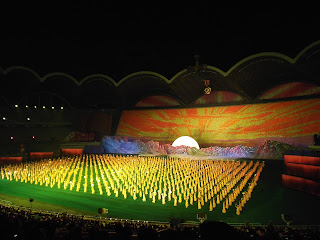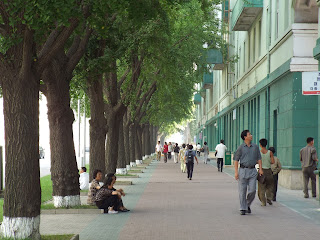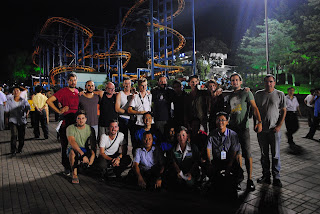I woke to a sky full of drizzle as the train neared Beijing. I had spent the night on one of the Chinese rail system's "hard sleepers", which meant that there were six bunks in the carriage, the top ones, one of which I occupied, taking a claustrophobia-inducing amount of space centimetres from the ceiling. It hadn't mattered. Sleeping had been easy. Now there was time to sit reading on the small fold-down seat in the corridor as the other passengers squeezed to and fro. We could only wait.
We arrived in Beijing at around 10 a.m., the square in front of the station crowded with the throngs of people, the ground wet and mucky from the rain that had fallen throughout the morning. I could remember the way to Tiananmen Square, and walked now in its direction.
I checked in at Leo Hostel. I stayed in this very place a few years ago. I walked through the courtyard at the back of the building and up the stairs to where the dorm had been on my previous visit, my memory triggered by sight. The cheap tiles had been replaced by cosy wooden flooring, the old bathroom now a laundry room. The computer room in the social area, redundant in this age of wifi, is now the TV room.
Outside, the streets south of Qianmen Station are almost unrecognisable. A glossy street of Western chain stores and souvenir shops now exists at a place where I can clearly remember clambering over half-dug ditches. I asked the receptionist at the hostel. She said this street was finished in 2009, the year after the Beijing Olympics. The atmosphere of the street right outside Leo's, meanwhile, remains much the same, a welcoming mixture of tourists, street food sellers and stands selling Mao satchels and military-style hats adorned with the red star.
When I stayed at Leo Hostel in 2006 I met a girl by the name of Hannah, who was about to leave for her home in England. She gave me a padlock as she no longer needed it and I had none. I attached it to a cord on the front of my backpack and promptly lost the key; the padlock has been there ever since, performing its useless function everywhere I have been. It was joined at some later date by a second padlock for which I do have the key but have not bothered to remove from the hook. I had noticed the padlocks for the first time in a while the previous day, when one of my fellow DPRK tourists had absent-mindedly toyed with them as she sat next to my backpack on the train from Pyongyang.
After I arrived at the 2013 version of Leo's, having checked in, I put the backpack down on the floor of the dorm and went to open the front pocket. After seven years of use, the cord had broken. The padlocks were lost.
I walked around the city with a friend from the DPRK trip. We took the metro to the headquarters of the aptly-named CCTV, the Chinese state television, a twin skyscraper joined at the top by a kind of dog-leg tunnel, a symbol of the unstoppable proliferation of construction in Beijing over the last couple of decades. We walked through a leafy embassy quarter and then Ritan Park, where children played on exercise equipment, adults sat by the lake, and couples danced the waltz to the sound of rustling leaves and trickling water.
Wandering through the old working-class quarters in the north of the city, the hutongs, as the sun set, we eventually arrived at the modern high street near Tiananmen Square, where there are always so many people that you can not walk in a straight line. The Square itself was closed to pedestrians. The entire front of the red pavilion at its northern end was under scaffolding, apart from the famous portrait of Mao, which we could see at an oblique angle from the adjacent road.
That was more or less the last thing I did on this by-land-and-by-sea journey from Tokyo to Beijing. I sat in the cafe at Leo Hostel and made the last preparations for the leap home and then I was invited by some French girls to join them and a group of other people as they celebrated someone's birthday. Something must have changed. After they went to bed, I finished my work, and turned in at about 3 a.m.
We arrived in Beijing at around 10 a.m., the square in front of the station crowded with the throngs of people, the ground wet and mucky from the rain that had fallen throughout the morning. I could remember the way to Tiananmen Square, and walked now in its direction.
I checked in at Leo Hostel. I stayed in this very place a few years ago. I walked through the courtyard at the back of the building and up the stairs to where the dorm had been on my previous visit, my memory triggered by sight. The cheap tiles had been replaced by cosy wooden flooring, the old bathroom now a laundry room. The computer room in the social area, redundant in this age of wifi, is now the TV room.
Outside, the streets south of Qianmen Station are almost unrecognisable. A glossy street of Western chain stores and souvenir shops now exists at a place where I can clearly remember clambering over half-dug ditches. I asked the receptionist at the hostel. She said this street was finished in 2009, the year after the Beijing Olympics. The atmosphere of the street right outside Leo's, meanwhile, remains much the same, a welcoming mixture of tourists, street food sellers and stands selling Mao satchels and military-style hats adorned with the red star.
When I stayed at Leo Hostel in 2006 I met a girl by the name of Hannah, who was about to leave for her home in England. She gave me a padlock as she no longer needed it and I had none. I attached it to a cord on the front of my backpack and promptly lost the key; the padlock has been there ever since, performing its useless function everywhere I have been. It was joined at some later date by a second padlock for which I do have the key but have not bothered to remove from the hook. I had noticed the padlocks for the first time in a while the previous day, when one of my fellow DPRK tourists had absent-mindedly toyed with them as she sat next to my backpack on the train from Pyongyang.
After I arrived at the 2013 version of Leo's, having checked in, I put the backpack down on the floor of the dorm and went to open the front pocket. After seven years of use, the cord had broken. The padlocks were lost.
I walked around the city with a friend from the DPRK trip. We took the metro to the headquarters of the aptly-named CCTV, the Chinese state television, a twin skyscraper joined at the top by a kind of dog-leg tunnel, a symbol of the unstoppable proliferation of construction in Beijing over the last couple of decades. We walked through a leafy embassy quarter and then Ritan Park, where children played on exercise equipment, adults sat by the lake, and couples danced the waltz to the sound of rustling leaves and trickling water.
Wandering through the old working-class quarters in the north of the city, the hutongs, as the sun set, we eventually arrived at the modern high street near Tiananmen Square, where there are always so many people that you can not walk in a straight line. The Square itself was closed to pedestrians. The entire front of the red pavilion at its northern end was under scaffolding, apart from the famous portrait of Mao, which we could see at an oblique angle from the adjacent road.
That was more or less the last thing I did on this by-land-and-by-sea journey from Tokyo to Beijing. I sat in the cafe at Leo Hostel and made the last preparations for the leap home and then I was invited by some French girls to join them and a group of other people as they celebrated someone's birthday. Something must have changed. After they went to bed, I finished my work, and turned in at about 3 a.m.


























































